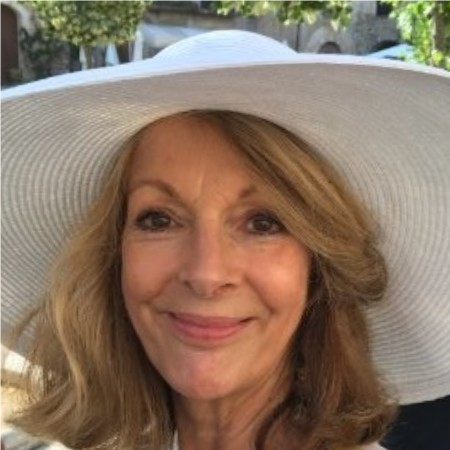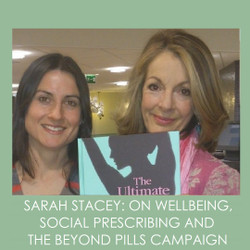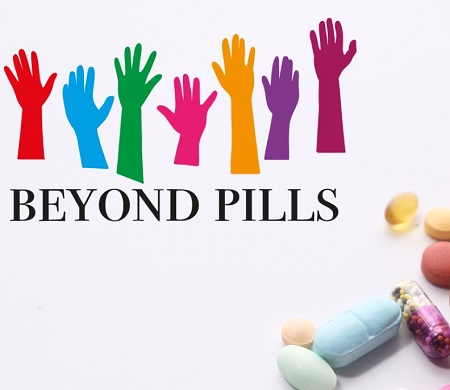Many of us know Sarah Stacey through her editorship of Beauty Bible, which she co-founded with Jo Fairley. But Sarah is also one of the UK’s most respected health journalists.
She was the first Chair of the Guild of Health Writers back in the 90s, the health editor of the Mail on Sunday for 17 years and has organised events including The Anxiety Epidemic with the Royal Heads Together mental health campaign.
It’s not surprising then that she’s turned her passion to two monumental medical challenges; over-prescription and the UK’s opioid crisis.
These are extraordinary problems across the globe, but especially in the UK, where in her piece ‘Pill free social prescriptions from the NHS’ Sarah shared that the "Government’s National Overprescribing Review, launched in September 2021, estimated that at least 10% of prescriptions dispensed at primary care (about 1.14 million items) are unnecessary, inappropriate or can cause harm – in some cases leading to premature death”.
Margaret (Weeds, my Mother and co-founder of Odylique / Essential Care) and I share similar principles to Sarah’s, believing that while pills may treat a disease, they do not treat the person.
We take a ‘nature first’ approach to wellness, so I was thrilled to have the opportunity to explore Sarah’s passions and views with her.
Q Sarah, can you tell us where your passion for health started?
I can’t remember a ‘moment’ but I worked for a private GP in 1971-73 and became immersed in the system of conventional healthcare. It certainly wasn’t something I was passionately interested in but I was interested in the patients and I also learnt a bit about how our bodies work, which I had never done at school.
Later, around the end of the 1970s, I realised that I was dangerously addicted to alcohol and prescribed pills. It was a matter of great shame and very lonely. It also led me to losing friends and jobs. That took me at the age of 29 to the only 12-step programme at the time – Alcoholics Anonymous – and I was astonished that being with people who had the same problem could help me kick the compulsions that had dominated my life. So that took me into the fascinating interdependence of mind, brain and body.
In 1987, I started writing as a journalist for newspapers as well as researching for current events documentaries. I wrote about a healer and his successes where conventional medicine had failed and talked to people with very different views about how it worked – while many medical scientists talked about quacks, one Nobel prize winner told me that there may well be forms of energy that we don’t understand.
Q How did you become involved with the College of Medicine Beyond Pills Campaign?
I’ve always felt that drug development and marketing should be primarily focussed on health rather than profit.
Over many decades this has led me to write about all sorts of different remedies and resources that are not based on pharmaceutical drugs and talk to amazing and enlightened practitioners from different disciplines.
In some cases these come under the heading of Complementary and Alternative Medicine, with therapies such as herbal medicine, acupuncture, traditional Chinese medicine and chiropractic. I also have a long family tradition of homeopathy and use it myself and for my animals – my great grandfather was an obstetrician who became a pioneering homeopath after his long-term and intractable digestive condition was cured by a homeopath. It’s a pity that the NHS has ruled that homeopathy doesn't work.
More recently, there has been the development of ‘social prescribing’, now recognised, supported and funded (to some extent) by the NHS. I first came across this in 2016 when the Kings Fund published a report on gardens and health and since then it’s been a major interest.
The first seeds of social prescribing started in the 1990s when GPs Michael Dixon, Sam Everington and William Bird (among others) realised that a significant proportion of their patients did not need medical care. They needed help with a range of life problems from loneliness to debt, anxiety to weight loss, and not least the lack of any joy in their lives.
Q How does social prescribing work?
In a nutshell, GPs or other health professionals in primary care practices refer patients to social prescribing link workers who can give them time that the GP does not have – usually three to six sessions of 45 minutes or so. The link workers often describe their primary function as listening and finding out what matters to the patient, then suggesting and signposting to resources in the community.
For instance, I know two suicidal women who were helped to transform their lives, one by singing in a choir, another by learning to draw and paint. A man who had become addicted to opioids and other dependence forming drugs over 25 years was helped by mindfulness and exercise. There are many, many other instances. Secretary of State for Health Steve Barclay has said he believes ‘passionately’ that ‘social prescribing can be empowering and potentially life-changing’.
This is not to say that drugs are never useful, of course they can be; a close family member has epilepsy for instance and I would never suggest they stop taking their anti-seizure pills. However, there are many situations where pills will never help patients to manage the underlying problems. Many GPs say they have known this for years, even decades, but there has been little they felt they could do about it.
Q Are attitudes changing in the NHS?
Things have been changing gradually with the concept of social prescribing but it’s fair to say not all doctors see the point or even take the trouble to understand it and although it’s part of the NHS England long term plan under the banner of ‘Personalised Care’, many people feel the NHS is just tinkering at the edges.
However, this is now changing, partly due to the Government’s National Overprescribing Review, published in 2021, which found that 10% of drugs dispensed from primary care prescriptions were inappropriate, unnecessary or could cause harm. The Review, authored by the then Chief Pharmaceutical Officer for NHS England, also made 20 recommendations, agreed with NICE (the National Institute for Health and Care Excellence). One of these was for an expansion of social prescribing.
That Review led to the College of Medicine Beyond Pills Campaign, which I co-founded with the College and a group of senior politicians. One of our independent advisors is Dr Keith Ridge, the former Chief Pharmaceutical Officer and editor of the National Overprescribing Review. We’re campaigning for greater recognition of the importance of social prescribing, more resources in the community including funding for some resource providers, and primary care to realise that reaching for ‘a pill for every ill’ is not the solution for many problems, whereas healthcare that embraces people’s whole lifestyle has a huge role to play in helping them to health and happiness.
Q Do you have your own ‘wellbeing prescription’? What are the non-pharma tools you’ve discovered to help you stay well?
Finding joy in relatively small things: being with friends, doing work that’s important to me, cooking good food, listening to music, spending a lot of time outside in nature – with my very old horses and our mad cockapoo Cassie. Or just gazing at the sky… And that wonderful remedy: soaking in a hot bath with scented oils and a good book.
Being upfront about problems is really important to me – not ruminating and letting them fester so I wake up in the early hours with a fretful brain.
My network of girlfriends is vitally important; I know that I can call on them at any time and we can all laugh and cry together. I was talking to one old friend the other day and we agreed that it would never occur to us for a second that the other one would not be there for us.

Q I read in your article about the work of Dr. Laura Marshall-Andrews, the Brighton GP and author of What Seems to Be the Problem, where she cites 30% of Brighton’s community as being long-term unwell. How have we all become so sick?
While I can’t point to a research review, there are factors that come up time and again. Ultra-processed food is a major contributor to the obesity epidemic, which is linked to many ill health conditions – about 2/3rds of the population at all ages is now overweight or obese.
My own bias is for a low carb diet as sugar doesn’t suit me, neither do grains so I keep away from bread, cakes, pasta etc. unless they are gluten free.
I would love to see us become like mainland Europeans in the countryside who have a little veg patch.
Anxiety and depression are huge contributors to ill health. Loneliness has been proven to be as damaging to health as smoking 15 cigarettes a day.
Lack of exercise - often because of being stuck indoors glued to a screen - is a big big problem.
And poor sleep patterns because of all the above.
Also – and this is not a small factor - just not finding things in life that bring joy, meaning and purpose.
Q How do you see skincare and beauty as fitting into health and wellness overall?
The name of the beauty industry charity Look Good Feel Better says it like it is. Most of us enjoy applying lovely products and seeing ourselves look good in the mirror. When you’re feeling low, getting your hair done, having a facial, or a manicure – whether that’s at a salon or a girls’ night in – can boost your mood quickly. Taking care of your appearance is an important way of valuing yourself.
But the effects may be more deep-seated physically. There was research we quoted in our first Beauty Bible showing that spending time on taking care of yourself helped support the immune system. It’s time that people can allocate for themselves – so-called ‘me time’ – and of course it incorporates touch, which can be healing in itself.
Then there’s new research on wrinkles, suggesting that they are much more than a cosmetic problem. There’s a link between wrinkles and low-grade inflammation as well as oxidative stress. According to a recent article in New Scientist, ‘Wrinkled skin appears to be toxic, pumping out compounds that accelerate age-related changes throughout our brains and bodies.’
So it’s time to ditch any residual guilt (so British!) about spending time and money on skincare. The great thing is that there are now wonderful, natural skincare products at moderate prices that really work.
For anyone interested in more information and stories about social prescribing and the Beyond Pills Campaign, visit the College of Medicine website here.


